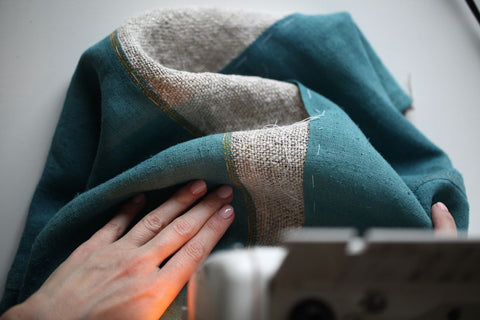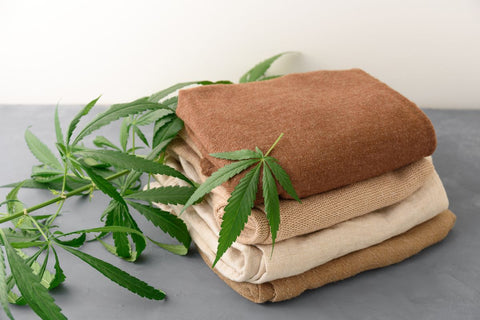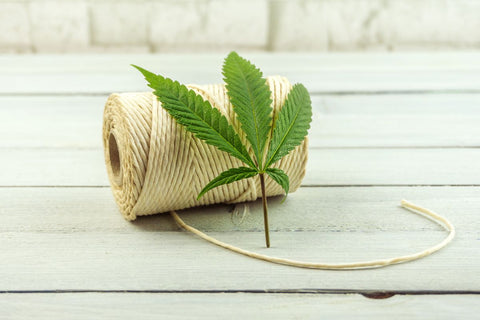Eco-Fabulous: Exploring the World of Ethical Hemp Clothing

Introduction
Hemp clothing is apparel made from the fibers of the cannabis sativa plant. Unlike marijuana, industrial hemp contains very low levels of THC and will not cause psychoactive effects. However, the plant is extremely versatile - hemp fibers are naturally more durable, absorbent, and antimicrobial than cotton.
As concerns grow over the environmental impacts of fast fashion, interest in sustainable clothing materials like hemp has skyrocketed. The global market for hemp-based textiles was valued at $1.3 billion in 2020 and is projected to grow to $5.7 billion by 2030. Brands like Patagonia, Levi’s, and Eileen Fisher have added hemp products to capture consumer demand.
The purpose of this article is to provide an overview of hemp fabric, discuss its rising popularity, and outline the benefits of hemp clothing. We’ll cover why it’s more eco-friendly than conventional fabrics, properties that make it ideal for clothing, and the future outlook for growth in the hemp textile industry. Whether you’re a consumer interested in green fashion or an entrepreneur considering this niche, you’ll learn all about this up-and-coming sustainable fabric.
The history of hemp clothing is a fascinating journey through time, showcasing the enduring legacy of this versatile fabric. Dating back thousands of years, hemp clothing has a rich and storied past that highlights its importance in various cultures worldwide.
Origins of Hemp Clothing
Hemp clothing traces its roots to ancient civilizations where hemp fibers were spun and woven into textiles for clothing. The use of hemp dates back to as early as 8,000 BC, making it one of the oldest fibers used by humans. Cultures across Asia, Europe, and the Middle East recognized the exceptional qualities of hemp, leading to its widespread adoption in clothing production.
Evolution of Hemp Textiles
Over time, the production techniques and uses of hemp textiles evolved significantly. From simple garments to intricate weaves, hemp fabrics became more refined and versatile. Innovations in spinning and weaving processes enhanced the quality and texture of hemp clothing, making it a preferred choice for durable and comfortable attire.
Historical Significance and Uses
Hemp held immense historical significance in various cultures for its multifaceted uses. In ancient China, hemp clothing symbolized purity and was worn during religious ceremonies. In Europe, hemp textiles were prized for their strength and durability, often used for sails, ropes, and clothing. The versatility of hemp made it a valuable commodity in trade and everyday life across different civilizations.
This brief exploration into the history of hemp clothing showcases its enduring presence throughout human history, highlighting its evolution, significance, and cultural importance.
Benefits of Hemp Fabric
Eco-Friendly Nature of Hemp
Hemp stands out as an eco-friendly champion in the world of textiles. As a renewable resource, hemp can be cultivated and harvested multiple times a year without depleting the soil. Its growth requires minimal water and no pesticides, making it a sustainable choice for environmentally conscious consumers.
The cultivation of hemp has a minimal environmental impact, as it absorbs large amounts of CO2 during its rapid growth, contributing to carbon sequestration and overall environmental health.
Breathability and Comfort
One of the standout features of hemp fabric is its natural breathability. Hemp fibers allow air to flow freely through the fabric, keeping you cool and comfortable even in warm weather. The texture of hemp fabric is known for its softness and gentle touch against the skin, making it a delight to wear.
Whether you're lounging at home or out for a stroll, hemp clothing provides a breathable and cozy experience like no other.
Durability and Longevity
Hemp fabric is renowned for its exceptional durability and longevity. The inherent strength of hemp fibers makes them resistant to wear and tear, ensuring that your hemp clothing lasts for years to come. Unlike other fabrics that deteriorate quickly with frequent use, hemp maintains its integrity even after multiple washes and wears. Investing in hemp clothing means investing in pieces that will stand the test of time, reducing the need for frequent replacements and contributing to a more sustainable wardrobe.
Experience the trifecta of benefits with hemp fabric: eco-friendliness, breathability, comfort, durability, and longevity all wrapped up in one fabulous textile choice!

How Is Hemp Clothing Made?
Process from Harvesting to Fiber Extraction
The journey of hemp clothing begins with the meticulous harvesting of hemp plants. Once the plants reach maturity, they are carefully cut and left to dry in the field. The dried stalks are then subjected to a process called decortication, where the outer fibers are separated from the inner woody core.
This decorticated fiber is then cleaned and processed to remove impurities, resulting in raw hemp fiber ready for further refinement.
Retting Process and Fiber Preparation
After extraction, the raw hemp fiber undergoes a crucial step known as retting. Retting is a natural process that involves soaking the fibers in water to break down the pectin that binds them together. This can be done through water retting, where the fibers are submerged in water, or dew retting, where they are spread out in fields to be exposed to moisture.
Once retted, the fibers are dried and further processed to ensure they are soft, pliable, and ready for spinning.
Spinning, Weaving, Dyeing, and Finishing
The processed hemp fibers are spun into yarn using traditional spinning techniques or modern machinery. These yarns are then woven into fabric on looms, creating the base material for hemp clothing. The next steps involve dyeing the fabric with eco-friendly dyes to achieve vibrant colors or leaving it in its natural state for a more organic look.
Finally, the fabric undergoes finishing processes like washing, softening, and quality checks to ensure it meets the highest standards of quality and comfort.
Hemp Clothing Market Trends
Growth in the Hemp Clothing Market
The hemp clothing market is experiencing a surge in popularity, thanks to the increasing demand for sustainable and environmentally conscious products. As more consumers become aware of the negative impact of fast fashion on the environment, they are turning towards hemp clothing as a viable alternative. The market for hemp clothing is expected to grow significantly in the coming years, with a rise in demand for durable, comfortable, and stylish garments that align with their values.
Consumer Preferences for Sustainable Fashion
Hemp clothing caters to a growing segment of consumers who prioritize sustainability in their fashion choices. These consumers are drawn to hemp clothing due to its eco-friendliness, durability, and comfort. They appreciate the fact that hemp is a renewable resource that requires minimal water and no pesticides, making it a more sustainable option compared to other fabrics.
As awareness about the environmental impact of fashion continues to rise, the demand for sustainable clothing like hemp will only increase.
Collaboration with Fashion Icons and Industry Trends
The hemp clothing industry is also benefiting from collaborations with fashion icons and industry trends. High-profile designers and brands are incorporating hemp into their collections, showcasing its versatility and appeal to a wider audience. This collaboration not only raises awareness about hemp clothing but also helps to drive innovation and creativity within the industry.
As more designers and brands embrace hemp, it is likely that we will see even more innovative and stylish hemp clothing options in the future.

Comparison with Other Fabrics
Hemp clothing is a unique and versatile fabric that stands out from the crowd when compared to other fabrics like cotton and synthetic materials. Let's delve into the key differences and advantages that make hemp a top choice for sustainable fashion.
Contrasting Hemp Clothing with Cotton and Synthetic Fabrics
Hemp clothing is often compared to cotton and synthetic fabrics due to its similarities in appearance and use. However, hemp offers several advantages over these traditional fabrics. For instance, hemp is stronger and more durable than cotton, making it a better choice for long-lasting clothing. Additionally, hemp is a natural fiber, unlike synthetic fabrics, which are made from petroleum-based materials. This makes hemp a more eco-friendly option, as it requires less energy to produce and generates less waste during its lifecycle.
Advantages of Hemp in Terms of Strength, Comfort, and Environmental Impact
Hemp fibers are known for their exceptional strength and durability. This means that hemp clothing can withstand wear and tear much better than cotton or synthetic fabrics. Moreover, hemp is naturally breathable, making it a comfortable choice for clothing.
The softness of hemp fabric against the skin is a testament to its comfortability. Lastly, hemp is an eco-friendly fabric, requiring less water and no pesticides during its cultivation. This makes hemp a more sustainable choice for clothing, as it minimizes the environmental impact associated with traditional cotton and synthetic fabrics.
Hemp Clothing Care and Maintenance
Taking care of your hemp clothing is essential to ensure its longevity and maintain its quality. Let's explore some tips and recommendations for washing, drying, and storing your beloved hemp garments.
Washing and Drying Tips
When it comes to washing your hemp clothing, opt for a gentle cycle with cold water to preserve the fabric's integrity. Avoid using harsh detergents or bleach, as they can damage the fibers. Hang your hemp clothes to dry instead of using a dryer, as excessive heat can cause shrinkage.
If you need to iron your hemp garments, do so while they are slightly damp on a low heat setting to prevent damage. By following these simple washing and drying tips, you can keep your hemp clothing looking fresh and vibrant for years to come.
Storage Recommendations
Proper storage is key to maintaining the quality of your hemp clothing. Store your garments in a cool, dry place away from direct sunlight to prevent fading. Avoid hanging heavy items on top of your hemp clothes to prevent stretching or misshaping. If you're storing your hemp clothing for an extended period, consider using breathable garment bags to protect them from dust and pests.
With these care and maintenance tips in mind, you can enjoy your stylish and sustainable hemp clothing for many seasons to come!
Top Hemp Clothing Brands
Overview: The Cannabis Company offers stylish, innovative hemp clothing for men and women. Their products are designed and printed in Australia using eco-friendly hemp textiles.
Popular Products:
- Blue-delic Black Long Sleeve Hemp T-Shirt
- Love Your Greens White Hemp T-Shirt for Women
- Green Peace White Canvas Hemp Tote Bag
Brand 2: Patagonia
Overview: Founded in 1973, Patagonia is a pioneering sustainable outdoor apparel company known for its environmental activism. They were one of the first major brands to offer hemp clothing.
Popular Products:
- Men's and women's hemp hoodies, t-shirts and cargo pants
- Sturdy, durable hemp board shorts perfect for surfing and swimming
Brand 3: Levi’s
Background: Levi's recently unveiled a 70% hemp/30% cotton blend denim line in response to consumer demand for sustainable fibers. This iconic denim brand is helping bring hemp mainstream.
Unique Selling Points:
- Leveraging the brand cachet and legacy of quality associated with Levi's
- Blends the comfort and durability of hemp with familiar fits and finishes expected from premium jeans
Brand 4: prAna
Overview: prAna creates sustainable comfort wear for yoga, climbing, hiking and more athletic pursuits. Their line of hemp clothing keeps you cool and relaxed before, during and after activity.
Popular Products:
- Hemp v-neck t-shirts, tanks and tees for men and women
- Stretch hemp yoga pants, capris and shorts
Brand 5: Eileen Fisher
Background: For years, Eileen Fisher has been a leader in ethical, minimalist apparel crafted from natural fabrics. They recently debuted a 100% organic hemp collection.
Unique Selling Points:
- Relaxed silhouettes and effortless draping
- Commitment to fair trade and sustainable practices
Brand 6: Jungmaven
Overview: Jungmaven prints graphic tees made entirely of hemp in America. By blending art with sustainability, Jungmaven makes eco-conscious apparel fresh and fashionable.
Popular Products:
- Super soft hemp/organic cotton blend t-shirts
-
Psychedelic, artistic prints executed via water-based inks

Customer Reviews and Testimonials
Positive Experiences
Customers rave about the comfort, durability, and style of hemp clothing. Many appreciate the natural breathability and softness of the fabric, making it a perfect choice for everyday wear. The longevity of hemp clothing is also a major plus, as customers report that their hemp garments last for years without showing signs of wear and tear.
Additionally, the eco-friendliness of hemp clothing is a significant factor, with customers feeling good about supporting sustainable fashion.
Common Concerns and Solutions
Some customers have expressed concerns about the cost of hemp clothing, but many agree that the investment is worth it due to the long-lasting nature of the garments. Others have noted that hemp clothing can be heavy, but this is often a trade-off for the durability and comfort it offers. Some customers have also mentioned that hemp clothing can be difficult to find in certain styles or sizes, but the growing popularity of hemp fashion is addressing this issue.
Explore the intriguing world of hemp clothing through these frequently asked questions that shed light on the benefits, production process, durability, and sustainability of this eco-friendly fabric.





